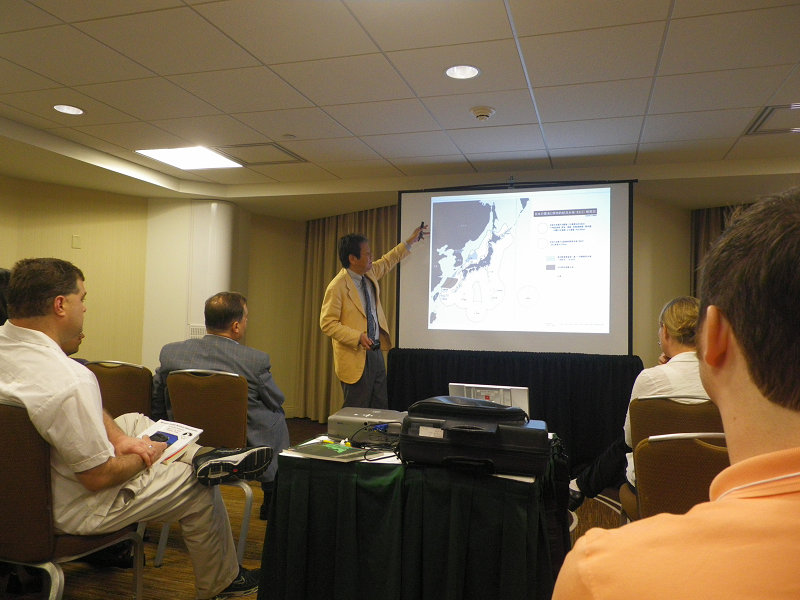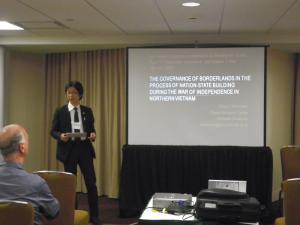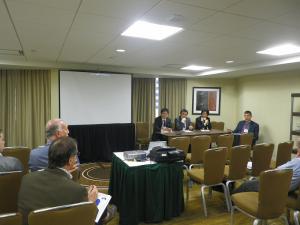
Report on the 2012 ABS Conference in Houston
2012/04/17
This year°«s ABS Annual Conference was held in Houston, Texas from April 12-14. The Global COE °«Reshaping Japan°«s Border Studies°« program was well represented by its leader, Professor IWASHITA and four of its researchers (Messrs.°« CHIDA, HIRAYAMA, HANAMATSU and FUJIMORI), while the presentations of Professor Naomi Chi (School of Public Policy, Hokkaido University) and Paul Richardson (Postdoctoral fellow, Japanese Society for the Promotion of Science) were also supported by the program.
 IWASHITA Akihiro°«s presentation, °»Breaking the Curse of Japan°«s Maritime Borders°… emphasized the importance of maritime borders to Japan, highlighting its prewar situation as an enormous maritime state and the current efforts to preserve its EEZ (Economic Exclusion Zone). He then utilized this maritime perspective to explain the significance of the BRIT XII Conference to be held in Fukuoka and Pusan in November later this year.
IWASHITA Akihiro°«s presentation, °»Breaking the Curse of Japan°«s Maritime Borders°… emphasized the importance of maritime borders to Japan, highlighting its prewar situation as an enormous maritime state and the current efforts to preserve its EEZ (Economic Exclusion Zone). He then utilized this maritime perspective to explain the significance of the BRIT XII Conference to be held in Fukuoka and Pusan in November later this year.
HANAMATSU Yasunori°«s presentation, °»National, Regime, and Knowledge Borders in Ecosystem Management: The Case of the Amur°ĺOkhotsk Ecosystem°…, highlighted how the Okhotsk Sea°«s maritime resources were contingent on protecting the environment of the entire Amur River system. These maritime resources are thus hostage to differences between Japan and Russia downstream, and China and Mongolia further upriver, and the presentation demonstrated the various policies that could increase coordination between these countries.
CHIDA Testuro°«s presentation, °»The Origins of Transboundary Water°ĺEnergy Problems in Contemporary Central Asia: °∆Transformation of Nature°« Concept and the Water Development during the Soviet Time°…, looked at the development of water rights in Central Asia. While pointing out that even today the region is historically affected by the °∆Great Stalin Plan for the Transformation of Nature within the USSR°«, he introduced the contemporary situation where, exacerbated by heavy industrial development policies in Western China, conflicts amongst the Central Asian countries and with their neighbors over water resources are increasing in intensity.
 HIRAYAMA Akihiro°«s presentation, °»The Governance of Borderlands in the Process of Nation°ĺState Building during the War of Independence in Northern Vietnam°…, utilized a rich collection of cartographic materials to explore the vicissitudes of Vietnamese territory. He particularly highlighted how the territorial flux of the French Colonial and Independence periods served to confuse subsequent policies of mass mobilization and taxation.
HIRAYAMA Akihiro°«s presentation, °»The Governance of Borderlands in the Process of Nation°ĺState Building during the War of Independence in Northern Vietnam°…, utilized a rich collection of cartographic materials to explore the vicissitudes of Vietnamese territory. He particularly highlighted how the territorial flux of the French Colonial and Independence periods served to confuse subsequent policies of mass mobilization and taxation.
FUJIMORI Shinkichi°«s presentation, °»Gaseous Borders: The Former Soviet Republics between Producer and Consumer°… emphasized how the differential in the price of gas that has been visible between the Russian and European markets did not reflect a °∆friendship price°« but existed because of profits in the gas re-export business and the structural profit obtainable through the export of electricity produced with cheap gas. However, with Russia°«s entry into the WTO and the spread in the use of LNG, maintaining such a price differential has become difficult, and in the future it is likely that there will be convergence at the 'market price'.
 With the members of ABS predominantly focused on North American borders (US-Canada and US-Mexico), these presentations, on Asian or former Soviet countries and grounded in primary sources, were from a little-known region of the world. Nevertheless, with points of similarity and difference being highlighted by both the discussants and in the questions from the floor, one looks forward eagerly to the expansion of such border research in the future. In particular, the possibilities of comparison with the enormous body of literature on riverine resources and environmental protection along the US-Mexico border region were clear.
With the members of ABS predominantly focused on North American borders (US-Canada and US-Mexico), these presentations, on Asian or former Soviet countries and grounded in primary sources, were from a little-known region of the world. Nevertheless, with points of similarity and difference being highlighted by both the discussants and in the questions from the floor, one looks forward eagerly to the expansion of such border research in the future. In particular, the possibilities of comparison with the enormous body of literature on riverine resources and environmental protection along the US-Mexico border region were clear.
 IWASHITA Akihiro°«s presentation, °»Breaking the Curse of Japan°«s Maritime Borders°… emphasized the importance of maritime borders to Japan, highlighting its prewar situation as an enormous maritime state and the current efforts to preserve its EEZ (Economic Exclusion Zone). He then utilized this maritime perspective to explain the significance of the BRIT XII Conference to be held in Fukuoka and Pusan in November later this year.
IWASHITA Akihiro°«s presentation, °»Breaking the Curse of Japan°«s Maritime Borders°… emphasized the importance of maritime borders to Japan, highlighting its prewar situation as an enormous maritime state and the current efforts to preserve its EEZ (Economic Exclusion Zone). He then utilized this maritime perspective to explain the significance of the BRIT XII Conference to be held in Fukuoka and Pusan in November later this year.HANAMATSU Yasunori°«s presentation, °»National, Regime, and Knowledge Borders in Ecosystem Management: The Case of the Amur°ĺOkhotsk Ecosystem°…, highlighted how the Okhotsk Sea°«s maritime resources were contingent on protecting the environment of the entire Amur River system. These maritime resources are thus hostage to differences between Japan and Russia downstream, and China and Mongolia further upriver, and the presentation demonstrated the various policies that could increase coordination between these countries.
CHIDA Testuro°«s presentation, °»The Origins of Transboundary Water°ĺEnergy Problems in Contemporary Central Asia: °∆Transformation of Nature°« Concept and the Water Development during the Soviet Time°…, looked at the development of water rights in Central Asia. While pointing out that even today the region is historically affected by the °∆Great Stalin Plan for the Transformation of Nature within the USSR°«, he introduced the contemporary situation where, exacerbated by heavy industrial development policies in Western China, conflicts amongst the Central Asian countries and with their neighbors over water resources are increasing in intensity.
 HIRAYAMA Akihiro°«s presentation, °»The Governance of Borderlands in the Process of Nation°ĺState Building during the War of Independence in Northern Vietnam°…, utilized a rich collection of cartographic materials to explore the vicissitudes of Vietnamese territory. He particularly highlighted how the territorial flux of the French Colonial and Independence periods served to confuse subsequent policies of mass mobilization and taxation.
HIRAYAMA Akihiro°«s presentation, °»The Governance of Borderlands in the Process of Nation°ĺState Building during the War of Independence in Northern Vietnam°…, utilized a rich collection of cartographic materials to explore the vicissitudes of Vietnamese territory. He particularly highlighted how the territorial flux of the French Colonial and Independence periods served to confuse subsequent policies of mass mobilization and taxation. FUJIMORI Shinkichi°«s presentation, °»Gaseous Borders: The Former Soviet Republics between Producer and Consumer°… emphasized how the differential in the price of gas that has been visible between the Russian and European markets did not reflect a °∆friendship price°« but existed because of profits in the gas re-export business and the structural profit obtainable through the export of electricity produced with cheap gas. However, with Russia°«s entry into the WTO and the spread in the use of LNG, maintaining such a price differential has become difficult, and in the future it is likely that there will be convergence at the 'market price'.
 With the members of ABS predominantly focused on North American borders (US-Canada and US-Mexico), these presentations, on Asian or former Soviet countries and grounded in primary sources, were from a little-known region of the world. Nevertheless, with points of similarity and difference being highlighted by both the discussants and in the questions from the floor, one looks forward eagerly to the expansion of such border research in the future. In particular, the possibilities of comparison with the enormous body of literature on riverine resources and environmental protection along the US-Mexico border region were clear.
With the members of ABS predominantly focused on North American borders (US-Canada and US-Mexico), these presentations, on Asian or former Soviet countries and grounded in primary sources, were from a little-known region of the world. Nevertheless, with points of similarity and difference being highlighted by both the discussants and in the questions from the floor, one looks forward eagerly to the expansion of such border research in the future. In particular, the possibilities of comparison with the enormous body of literature on riverine resources and environmental protection along the US-Mexico border region were clear. 





